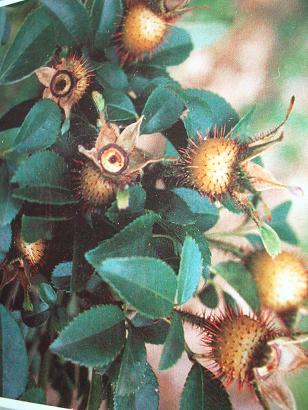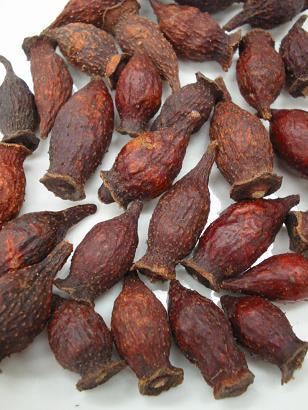Fructus Rosae Laevigatae
- Name
- Origin
- Where Does It Grow?
- Nature and Flavor
- Identified Active Components / Major Chemical Constituents
- Drug Actions in TCM

- Traditional Uses in TCM
- Pharmacological Actions
- Toxicology
- Administration and Dosage
- Adverse Effect, Side Effects and Cautions
- References
Name
Latin Name: Fructus Rosae Laevigatae
Common Name: Cherokee rose fruit

Scientific Name: Rosa laevigata Michx.
Chinese Name: 金櫻子
Pinyin Name: jin ying zi
Origin
The dried ripe fruit of Rosa laevigata Michx., an evergreen climbing shrub plant of family Rosaceae.1
Where Does It Grow?
Cherokee rose fruit is mainly distributed in Guangdong, Sichuan, Yunnan, Hubei and Guizhou provinces of China.1
Nature and Flavor
Cherokee rose fruit is sour and astringent in flavor, neutral in nature, and mainly manifests its therapeutic actions in the kidney, bladder and large intestine meridians.1
Identified Active Components / Major Chemical Constituents
Cherokee rose fruit contains citric acid, malic acid, tannin, resin, vitamin C, fructose and sucrose. Additionally, the content of saponin is about 17%.2Drug Actions in TCM
Cherokee rose fruit astringes seminal and intestinal discharges, arrest excess urination and bowel movements.1Traditional Uses in TCM
Pharmacological Actions
Animal studies
Toxicology
Administration and Dosage
For decoction, the suggested does of Cherokee rose fruit is 6-12g.1
Adverse Effect, Side Effects and Cautions
Not suitable for individuals with excessive heat signs, such as fever, thirst, mouth sores, gum swelling, constipation, urinary difficulty and a red tongue.
References
- Lui Daiquan, ed. Chinese Medicine. Shanghai Scientific and Technical Publishers, 2000-6.
- Li Jiashi, ed. Chinese Medicine Identification. Shanghai Scientific and Technical Publishers, 2000-6.
- Wu Yiluo. Bencao Congxin (New Compilation of Materia Medica), 1757AD.
- Li Shizhen, Bencao Gangmu (Compendium of Materia Medica) 1578AD.
- Jiangsu Modern Medicine College, ed. Pharmacopoeia of Chinese medicine, Volume II. Shanghai Scientific and Technical Publishers 1986?2698.*
- Nan Yunshen & Zhang Lihua, et al. Study of processing of Fructus Rosae. Chinese Herbal Medicine 1995, 18(6): 293.*
- Quoted in "Zhou JG ed. Clinical application and pharmacology of Chinese Medicine. Huaxia Publishing Company Ltd, 1998: 527-528" Tianjin Scientific Technology Publishing, 1999: 1248-1250"


